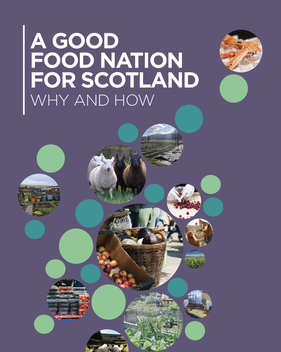 If it is not already obvious why we need a Good Food Nation Bill for Scotland, what it needs to achieve, and how this can be done for best effect, some of the answers are in this brand new report from the Scottish Food Coalition It provides a detailed picture of how broken our food system is and why we must do better. It draws an inspiring picture of what ‘better’ looks like. Additionally, it gives concrete recommendations for how the Good Food Nation Bill can help us get better over time, with case studies of good practice that start to point the way. The nearly 50 Scottish Food Coalition members collectively set themselves the task to write this report to inform decision-makers in food policy, especially the Rural Affairs, Islands and Natural Environment (RAINE) Committee who are leading on the Good Food Nation Bill that is set to be passed in Summer 2022. The process began with a call for evidence from SFC members in July 2021 36 coalition members submitted the most recent reports published in their areas, statements of their visions for a better Scotland, and their recommendations for how we can achieve these. They identified 123 reports, blog posts and journal articles. We gathered evidence from young people via workshops and a survey. We conducted a research review of national and international literature. During Stage 1 of the Good Food Nation Bill, we held workshops to debate common threads and iron out tensions, and invited SFC input on drafts. Alongside this work, Professor Mary Brennan (SFC Chair) toured nearly 30 case studies As part of Mary’s Tour she visited examples of good practice across Scotland, starting in Shetland in February and ending in Arran & Islay this week. Their focus ranged widely and included dignified support in the face of food poverty, enabling better diets, building on community resilience, reconnecting people with food, food waste management and the circular economy, nature- and climate friendly farming, animal welfare, public procurement of local food, networks of local food supply chains and workers’ rights. The report represents the collective voice of the Scottish Food Coalition and has emerged as the result of a joint effort involving many people. This work provided a strong basis for our campaign towards a stronger bill: for the written and oral evidence we submitted to the RAINE Committee, for the many meetings we organised to lobby Members. It underpins the amendments we submitted to strengthen the Bill as it enters Stage 2. We have sent the report to MSPs, government officials, their researchers and staffers, and to Local Authorities. It will be in the hands of Local Authorities, Health Boards and associated public bodies to underpin and enable the good work of our inspiring examples, and to take forward our recommendations in other ways. Arguably, it is generally easier to say what’s wrong than to work out how to fix something. The concrete examples in the report move the discussion on by showing how people across Scotland are actually making progress. The challenges they are tackling are complex and tricky to rectify. We recognise that there are no easy answers, and this report does not claim to provide them all. We are hopeful that it will continue to serve as a reliable reference document that has something useful to say about these wide-ranging issues in our broken food system, and about the ways in which we can begin to fix them. If you would like to order a paper copy of the report, please email miesbeth@nourishscotland.org.uk with your address. Please click here to access all references from the report.
0 Comments
Leave a Reply. |
AuthorMiesbeth Knottenbelt works as Project Officer at Nourish Scotland. ArchivesCategories |
Proudly powered by Weebly

 RSS Feed
RSS Feed